Sam Szabo is a Massachusetts-born, Chicago-based cartoonist whose work centers heavily on themes of queerness and trans identity with an unmistakeable twang from the influence of MAD Magazine, National Lampoon, and both pre- and post- code EC Comics. Her graphic novel, Enlightened Transsexual Comix, was published by Silver Sprocket in 2023. Enlightened Transsexual is Szabo’s longest work to date, following the dialogues, debates, and soliloquies of the hilarious, triple-breasted and three-eyed Enlightened Transsexual. It’s a Platonic Dialogue of trans people, as hilarious as it is insightful. Szabo has work in the anthologies Bernadette and Poison Pill, and has made extensive self-published series with Comix Will Break Your Balls, Momix, Girl Hell, as well as the zines Bad Day, Virile and Hours: A Hero's Journey, to name just a few among very, very many .
I spoke with Sam over Zoom this past July to discuss her new book, comics history, and her experience as a queer cartoonist.
-Tate McFadden
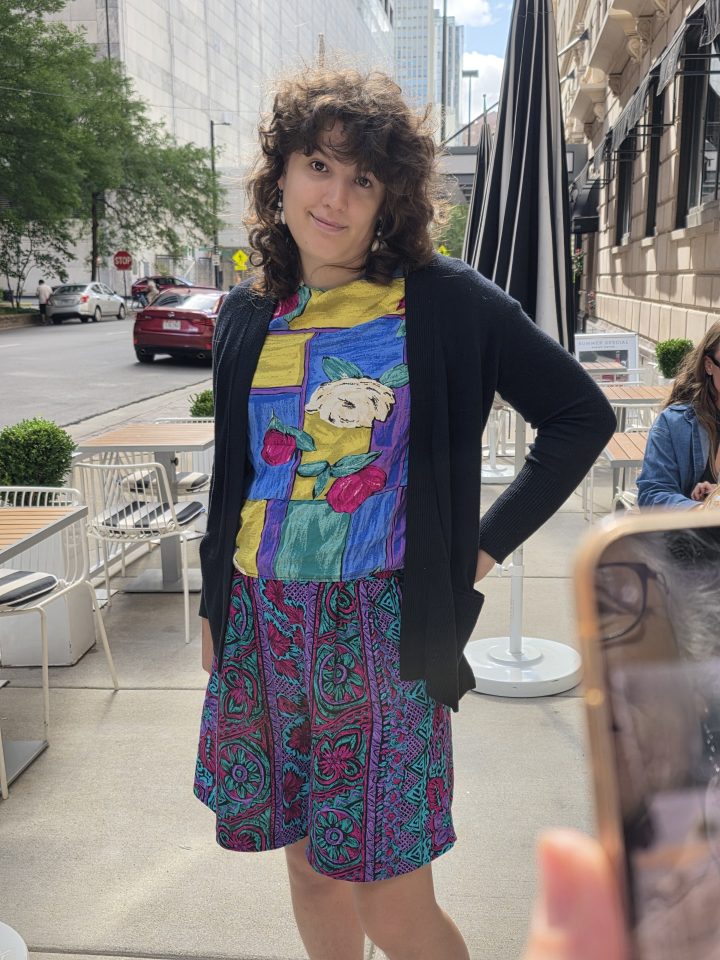 Sam Szabo photographed by Thomas Szabo
Sam Szabo photographed by Thomas SzaboTATE MCFADDEN: You grew up in small town Massachusetts, what was that like?
SAM SZABO: It's fresh in the mind. I literally just got back late last night from doing an art show there, which was really special. I'm from Newburyport, Massachusetts, a beach town along the north coastline of Boston... trying really hard to not use the word "suburb". It's its own city. It's been pretty badly gentrified, à la Martha's Vineyard, but it has a pretty cool tradition. It was kind of a boho-art-scene corner of Boston in the eighties and nineties around the time I was growing up. It has definitely been choked out a little by rising property values, so it's maybe not the hub that it was in the eighties, but it's still very quirky.
It's gotten a little ritzier since then, but it is a very small town with kind of a cursed Lovecraftian aura. A lot of Lovecraft's writing, The Shadow over Innsmouth specifically, is based directly on Newburyport. Lovecraft was famously weirdly obsessed with this town, so it's got sort of a spooky fisherman town vibe. When I was a kid, it had kind of a bohemian arts sector of Boston thing going on, and now it’s kind of got a Martha's Vineyard, Obama-summer-home kind of vibe to it, which is kind of a bummer. But it’s still got a really cool, vibrant art scene. It's definitely a lot freakier than Boston proper. I just got back from a trip back there to do my first hometown gallery installation in this gallery that's been around for longer than I have. I got to do that with a lot of childhood friends who are in the arts now, it was really cool.
There's a lot of theater out there and the median population has gotten a lot older now, but there's been an influx in young art school girls. I feel like a lot of the Gen X art school girls are now taking over a lot of the big cultural institutions. My friend Bell Carver Struck just took over the very long running gallery there, Newburyport Art and, and programmed the show. I've been working on a lot of writing about the history of the city lately. I got to meet the new people running the museum who were also cool art school girls, we all got to smoke cigs and go to the local dive bar. I was feeling kind of pessimistic about the future of my hometown, but this visit was very affirming and made me feel like maybe it has not been totally throttled yet.
My earliest memories are people complaining about how the culture was dead. Yuppies were taking over, blah, blah, blah- and it's not that they weren't right, but it is true that, coming home, I also got to meet a lot of younger artists who were taking the first steps in their art careers. We're definitely still producing freaks. I think a lot of the concerns I'm articulating here are true of Boston too. But there's some very cool cultural history with Boston. Boston gave us Donna Summer, they gave us a lot of good punk bands and I think even in the lamest city, if you dig deep enough, you're gonna find the freaky roots.
Tell me a bit about you as a little queerdo kid. How is it that you grow into a person who writes a book called Enlightened Transsexual Comix further down the line?
I was a weird child for sure. I definitely stood out given the general climate of the metro Boston area in the early thousands. I think it's shocking how unbullied I was. I was given a wide berth by the normal kids, and I'm still very close to a lot of my high school friends, which is kind of crazy. That just seems like total luck in hindsight. But I definitely stood out. I was a very weird kid and it was a very small town. I was kind of a lock for class clown.
My mom, who is another subject of a lot of my writing, was the English teacher in the high school in this small town, teaching there for over 45 years now. So basically every adult in this town had had my mother as a teacher, which conferred a very weird sort of diplomatic immunity to me as a kid. Authority figures were all kind of afraid of my mom, you know, every officer is a student. That gave me a very weird perspective on society because people would revert to their child selves when they were around my mom. My mom is a very powerful woman with a large personality, and it was from her that I started writing, really. I really wanted to be a poet when I was a kid, I didn't start making comics until adulthood. I was kind of a compulsive doodler, but I was not making comics. But I always wanted to be a writer.
Is poetry something you're still interested in?
I still enjoy poetry and I think I think I may have just become too irony poisoned to allow myself to express myself in that way, which I'm not proud of. That's something I would like to move past because I like poetry a lot. I definitely even read it now a lot less than I did when I was a kid. But I also think that growing up being into poetry and performance poetry, I was like a poetry slam kid, everything I created during that phase was incredibly embarrassing. I do think that there's actually a lot of overlap between comics and poetry, and I'm probably not the first person to observe this, but that's a pet theory that I will often bust out if you get me drunk. There's a rhythm to comics that I think poetry's kind of the closest analog for it in terms of the way you internalize rhythms and the ways that you can play with structure or disregard it entirely. They don't get talked about together very often, but the transition from one to the other was a lot easier than I thought it would be.
I was really into formal verse. I was writing a lot of sonnets. I liked rigid structure a lot, and I think that's part of what appealed about comics to me is the grid. I have OCD and I actually really like when things fit neatly. I think I find myself drawn inexorably toward things with very clear rules.
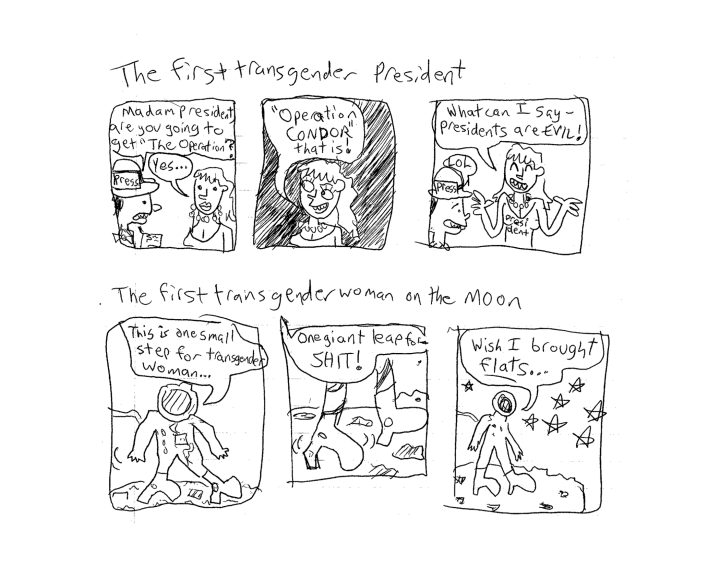 page from Comix Will Break Your Balls by Sam Szabo
page from Comix Will Break Your Balls by Sam SzaboWere you a newspaper strip kid? What was catching your interest?
I was reading comics a lot as a kid, and was really obsessed with Mad Magazine and newspaper comics. I think those were my two big gateways. Mad Magazine was a lot of ways like the vertex for Underground Comics because it's sort of the transitionary phase from the EC Tales From the Crypt into all the head shop stuff.
The connection for me started as I got really into increasingly deep cuts of newspaper comic strips. I would obsessively go to the comic section of a used bookstore, looking for The Far Side and Calvin and Hobbes. And then it got to the point where I would just get anything, I was really into esoteric newspaper comics from the age of eight. I was really into things like Bloom County and bizarrely obsessed with Doonesbury . The very dry strips that were referencing pop culture niches or events that took place before I was born. At a typical used bookstore often they're not filing these books separately. If a few underground comics do make their way onto the shelves, they're gonna put it next to Calvin Hobbes.
I remember trying to get Calvin Hobbes as a kid, and I think I found Too Much Coffee Man by Shannon Wheeler, which is maybe not an influence that is gonna get name checked that often by my generation or milieu. That was kind of a mindblower because I was like 10 when I read it, and I was just like, oh, like cigarettes… Hmm… My library would just file the Chris Wares next to, Prometheus or whatever. I think one of the frustrating, but also beautiful things about comics is the way that this extremely eclectic culture is compressed into one shelf in physical space and when you're a kid, you're just kind of consuming it all uncritically.
By mid high school I was actually consciously seeking stuff out. So I was getting into Chris Ware, I was getting into the graphic novel set or whatever. But I still didn't get, deep, deep in until college when I took a class on [comics]. I had a professor who was encouraging me to pursue that stuff, and then I had a chance encounter with Lynda Barry at that point I was just like, ‘I'm gonna be a cartoonist.’ But that all happened very quickly.
What undergrounds do you remember reading?
A huge one for me was Kramer's Ergot #6 it had a lot of people who are my friends now. Paper Rad was huge for me. I think I remember seeing my first Paper Rad comic in that Kramers and being like, this is the funniest thing I've ever seen in my entire life. It's a little bit of a boys club to this day, there's plenty of criticisms to be made of it too, but it was maybe the most instrumental in terms of exposing me to the artists who are still my biggest influences.
It was my first time seeing John Porcellino and Vanessa Davis too, who's huge, Matthew Thurber. Pretty much every comic in that sixth issue is a heater. I went to the same school as a couple of them, and there was a complete archive of, all of their works in the school library, and I would just do acid in the library, and I would watch, they had a bunch of videotapes of their really rudimentary animations and all of their early zines. That was a huge game changer for me.
I really miss anthologies and I've been thinking about anthologies a lot. I've been working up the gumption to try to edit one of my own. I applied for a grant this year, but I didn't get it. It feels like we're heading towards a little bit of an anthology renaissance. I feel like a lot of peers of my generation of cartoonists are starting to look toward the print anthology as a viable format. But it felt like the anthology was kind of dead for a while. And when I think back on like, the books that really blew me wide open, it was those anthologies because often in the anthologies, you're kind of smuggling in stuff that's even weirder than the weird stuff that it's clinging to the underbelly of?
Would that be an anthology of you and a bunch of other artists?
The thing that I really wanna do is I want to do an anthology of all trans humor comics, which as far as I know, doesn't exist. And I have a perfect name for it. I was gonna call it Travesty Comics. Chicago, if you're listening, I'm going to try again next year. Please fund this. Trans cartoonists are not new. I'm not the first, and there's been quite a few of us for a while, but I do feel like only in the last couple of years have I really discovered so many really funny trans cartoonists to the point where I feel like that could easily be an ongoing anthology.
Drop some names. Who are you thinking?
Raven Lyn Clemens has really been on a tear. I'm really enjoying all stuff she's putting on Instagram lately. I've been enjoying Duck Cruz's stuff. Haus of Decline, obviously. There are a lot of trans cartoonists who I wouldn't want to identify exclusively as humor cartoonists [that] I think are incredibly funny, like Francis Cordelia Beaver and Ana Woulfe are so funny. But they also have ambitions beyond gags. I think most trans cartoonists are really funny. I haven't given up on this idea. I'm hoping to find a way to make it a reality like in the next year or so.
Another big project that did get off the ground which I'm hoping to bring back is Poison Pills, an anthology I did with M.S. Harkness, Caroline Cash, Audra Stang, Victoria Douglas, Heather Loase, was that everybody? It's always a little dicey, like building an anthology around identity. We kind of did the ‘All Girl’ thing by accident. We just all felt like we were aligned in a certain channel of autobio that we weren't seeing a lot of elsewhere. So I feel like that got painted as more of a ‘Girl power. We're all women doing comics,’ kind of and vibe. I'm proud to bear that mantle, but I don't think we really realized that's what we were doing when we put the anthology together.
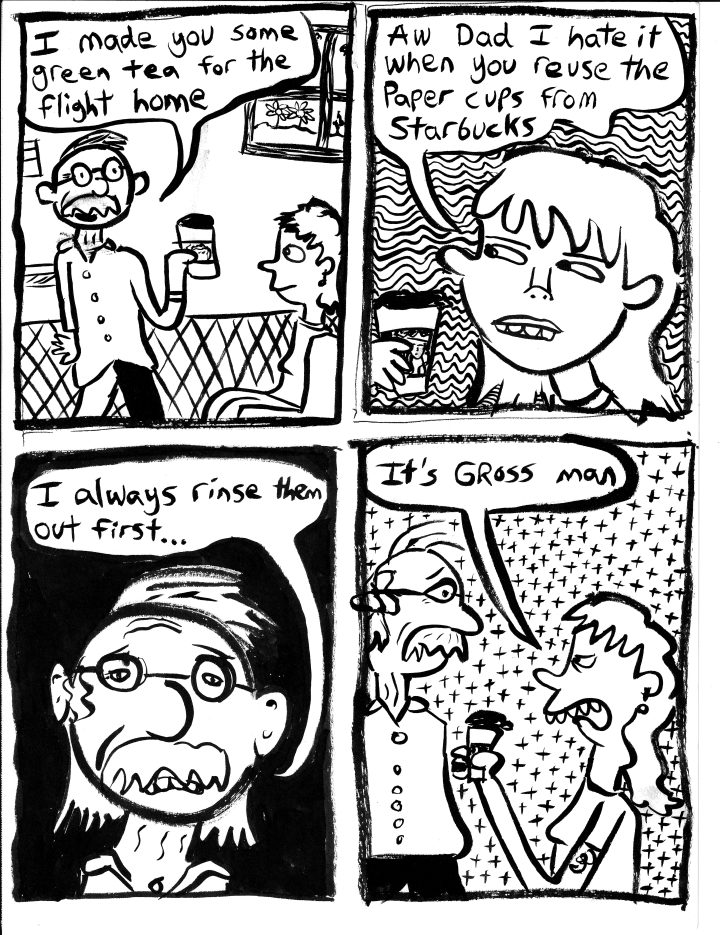 Thomas Szabo in conversation with Sam Szabo, by Sam Szabo
Thomas Szabo in conversation with Sam Szabo, by Sam SzaboFinishing up on the gallery you were just a part of, how did that go?
It was great. The theme was coming home and the idea that this new curator of the art gallery had was to have a kind of a running show of people who currently or formerly lived in Newburyport.
I'm actually working on two books that both deal with my upbringing in that place. So it was really cool to be able to show this stuff. I have one book which I have written about half of a draft of and have been publishing in little zine forms called Virile. And it started out as a short story for Girl Hell. But basically when I was a kid, there was one out trans woman in my hometown, and she was friends with my parents. As she got older, she kind of became reclusive and crazy so I saw less and less of her, but she had a huge influence on me. She was my first encounter with a trans woman and it was weirdly not remarked on. She was weird outside of being trans. She was just a strange old lady. And I think she kind of had strange old lady status within the community. People were very chill about her transition, all things considered for a small town in the metro Boston area.
I kind of remembered her early on in my transition and sort of latched onto these memories of her. And so I went back home and I started interviewing her friends who were still alive and slowly started to end up writing a biography of her, which became kind of an oral history of the town. Because what I discovered in talking to people that knew her was she was also an artist and a cartoonist and a photographer, she'd actually made political cartoons for the paper. Then I just got an email from this art gallery. They had no idea I was working on this [biography], but it wound up being a super cathartic moment for me to get to share this project
The other thing that I'm working on, and that project is still ways off, but the, the project that I will hopefully be releasing like later this year is a series of comics I've done about my mom called Momix. I've been doing comic strips about my mom for over 15 years now. And most of those zines are out of print, but I'm working on collecting them in a huge book. Like I said, this is a very small town and my mom has taught at the high school for over 40 years. So it was another situation where I was showing all this art that I'd made about a person that nobody's ever heard of to all the people that knew her.
I've kind of been on a weird trip this year where I've been writing a lot about childhood memories and people in my life who were really impactful to me. And when you're that deep in it, it's sometimes hard to know how much of the personal significance of that stuff is going to be conveyed to somebody who has not lived your life and has not met these people. That's your job as the writer to make them feel that. But in my experience, you don't really know if you're able to do that until you start to get feedback. I'm kind of scared to put them out into the world because I really don't know how they're gonna be taken by other people.
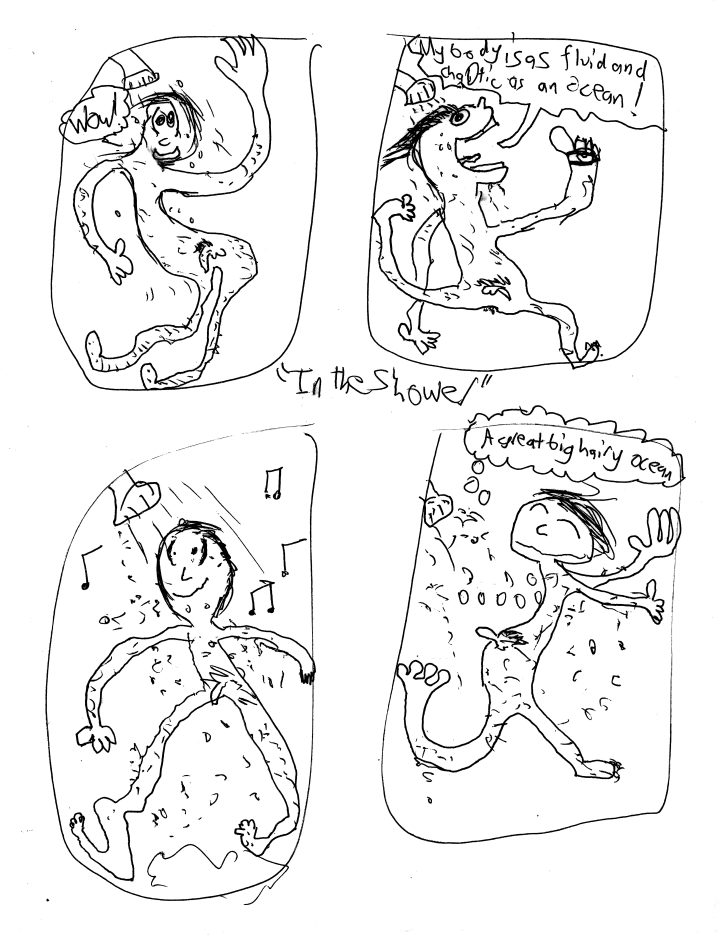 In the Shower by Sam Szabo
In the Shower by Sam SzaboOne of the artists that I see a lot of on the page when I read your work is Aline Kominsky-Crumb. Her work is so fascinated with the subjectivity of the confessional comics mode. And also just the subjectivity of memoir and the autobiography as something that can never truly be objective. How you think about autobiography when you're writing something like Enlightened Transsexual that has an intensely comical and fantastical character, but also so much of what I presume to be you in that and where to see that in conversation with Aline?
No, I mean, Aline was a huge influence on me for sure. I always think about my creative process as being two channels in my brain. One is memoir and one is gags. I guess you could reduce it to Aline and Robert [Crumb] if you wanted to, although that's not quite a one-to-one analog. The two of them were big influences in different ways. I've always identified as a memoirist above all else. And I feel like even before I did comics and I was doing poetry, I was doing a lot of auto-fiction. Basically everything I was writing was pretty directly autobiographical. I've always felt like that's the anchor that I find myself getting dragged back towards.
The other side of me, the gag side, I feel like almost developed as sort of a release valve, where if the comics are getting too painful or too sappy or too sincere, I will do the gags to blow off steam. I used to actually just alternate zines where I would have a very sad kind of mopey autobio comic, and then the next comic would be just all dick jokes. At this point, with Enlightened Transsexual Comix, that was the moment where those two sides of my brain started to cohere. But there are elements of the gag in my autobio and there are elements of the autobio in my gag.
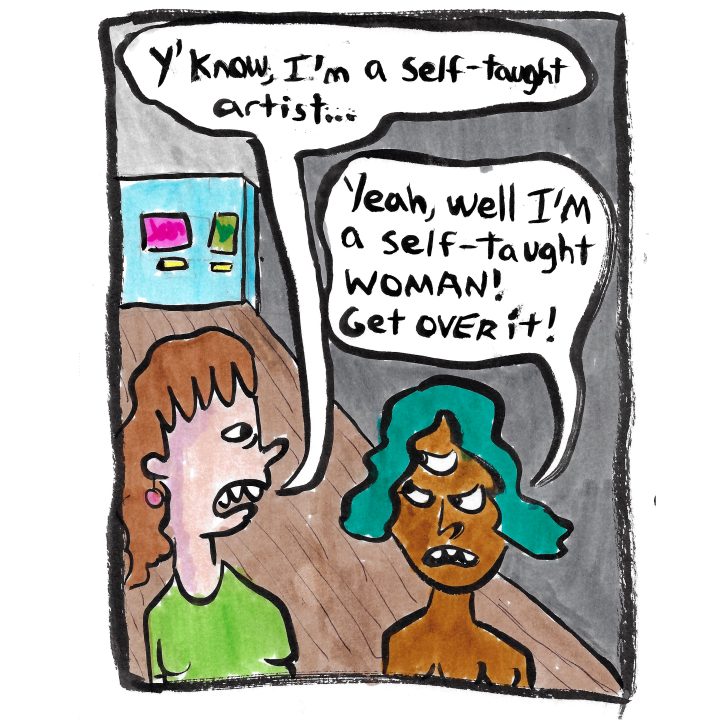 panel from The Enlightened Transsexual by Sam Szabo (Silver Sprocket, 2023)
panel from The Enlightened Transsexual by Sam Szabo (Silver Sprocket, 2023)I feel like I got the balance perfect with Enlightened Transsexual Comix. The ratio is always different, and I can turn up and down the gag stuff as I need to as it suits the purpose of the story, but really it is just a defense mechanism. The gags just come unbidden if I feel myself getting too vulnerable. All of which is to say yeah! Aline was a huge influence on me. The wretchedness of Aline was a big influence on my work. I think my pre-transition work, which is largely out of print for good reason, is very much suffused with the kind of self-loathing that you get in pretty much any Aline Crumb comic because I was really wrestling with that a lot at the time.
I think that the Wimmen’s Comix cohort were the women who were really grotesque, greedy, self-loathing…stuff like that. That stuff's obviously really fun and the kind of disgustingness of it, and all of Aline’s zits and hair look looks perfect. I think that sort of nastiness was really interesting in the context of second wave feminism and the Haight-Ashbury world that those women inhabited.
You still see a lot of echoes of it today and like I would say a lot of the female autobio cartoonists including a lot of the female autobio cartoonists who were in Poison Pill. Like Heather, I feel like, is really carrying on that tradition so gorgeously. Post-transition I still like the wretchedness, I still love body dysmorphia comics. That's still my bread and butter, and it was especially true early in my transition. I try not to get too in the hall of mirrors of good or bad representation when I think about what my job is as a trans cartoonist. And I still love to kind of wallow in the mud, in the muck, but I do feel a little bit more of an obligation to think about what I'm doing with that stuff.
Sometimes I feel like it's not so much an issue of good or bad representation, but there are times when I feel like by indulging that self-loathing in trans art, I'm becoming part of the problem a little bit. So I feel like it's something that I've had to be a little more judicious about as I've gotten older and a little more secure in what I'm doing.
There are a bunch of different literary and philosophical references scattered throughout Enlightened Transsexual Comix but the one that stood out to me the most was the little Valerie Solanas comedy sketch. So much of Enlightened Transsexual is concerned with concepts that Solanas wrote about, from Scum to unwork, to gender essentialism and the consequences of second wave feminism. How do you think about her work and Scum and the sub-alternality of being an enlightened transsexual?
I am not a Solanas expert, but I do make a lot of Solanas jokes because I am fascinated by her as a concept and by the SCUM Manifesto in particular, I love wretchedness! I'm punk. I grew up being into punk stuff, and there's a rich tradition of nastiness and fluids and underground comics. So that stuff was my bread and butter even before I was reading second wave feminist theory and coming into my own as a trans woman and transitioning.
I was already very predisposed towards nastiness from a young age. But I do think that there's something really interesting with Solanas that you haven't really seen before, or even much since, which is nastiness almost as a rhetorical device. Abandoning respectability, not necessarily in an ironic way. Irony is an aspect of it, but it feels reductive to call what she's doing irony. It’s abandoning respectability as a strategy or as a means of illustrating a point. I think on some level, conscious or unconscious, that does inform a lot of what I'm doing with Transsexual or just in general a lot of the time with what I'm doing with my gags when I'm writing humor, because I think there is something powerful in just being mean.
There's power in being hypocritical, being wrong, being violent, and just sort of creating this worldview that is a reaction to this incredibly hostile world and theological framework that you're forced to operate within and reflecting that back.
There’s a weird imperative that artists in marginalized communities have to set a good example or create a good image of themselves and their community when they write about their identity especially. The first chapter and Enlightened Transsexual starts with the Enlightened Transsexual saying “That's right, I'm transgender, but don't worry, I'm cool about it. A lot of trans people don't like when you say insensitive shit to them, not me though, nothing you can say could possibly hurt or upset me. You mean nothing to me.”
That’s a very common defense mechanism or survival strategy in reaction to a really cruel world. There's a really tongue in cheek aspect to that chapter. It ends in with a dick, after all, but is part of being an ‘enlightened transsexual’ the ability to transcend the cruelty of the cis world?
A couple things are coming to mind. First of all the whole book was born out of that one comic, and that one comic was just meant to be like a little epilogue in the Girl Hell series of zines but I wound up creating this whole alter ego. Like I said, the gags are the safety valve, and there's always a certain point at which straightforward memoir starts to chafe. I experienced that on and off throughout my career. I think this is not unusual for trans writers. Somewhere about the second year of transition when you start to gain sentience, and you start to hear yourself talking.
This is good. This is part of the puberty, and it augurs your next phase of intellectual thought or the next phase of the art you're trying to make. When I was making the Girl Hell zines, which were very rough, raw, diaristic stuff over the course of my first year of transition, I was pretty much just reproducing pages from my diary. And I was just like, ‘I'm a mess right now. And I'm also in a kind of uniquely weird, vulnerable shifting place. I feel like I need to capture this moment, and I'm just going to put it all out there and I'm not gonna edit it at all. And I'm going to just accept the fact that this will be embarrassing in a few years. But I need to make the art that I need, and write down what's going on in my head right now. I need to make that art. I need to make it available.’
In hindsight, I'm really glad I didn't have a very large audience at that time, because it made it a lot easier to make a choice like that. I've decided to keep it in print because I do think it's a valuable time capsule, but obviously a lot of that stuff is embarrassing to me now. And I was writing everything. I was working through a lot of self-loathing and working out some very clunky baby's first gender theory stuff.
I was constantly explaining my experience as a trans person, and maybe even overexplaining, giving the people in my life TMI talking about what surgeries I wanted to get, basically I felt enlightened. Like I had access to all of this, fascinating information that nobody in the history of the human race had ever understood before and I was duty bound to explain this stuff.
In the back of my mind there was some sense that I was also doing all of this explaining because I needed to justify my own existence. And that if I could just make myself understood, then I would be accepted, or I would be safe, or I would be allowed to exist within this frame of work. But I think that this impulse to explain ourselves, I come by it honestly 'cause I'm a nonfiction writer, and I was before I transitioned, but I think that it was starting to come from this unhealthy place where, yes, I wanted to share these cool thoughts I was having with people, but also I did want to be enlightened. This idea that I'm a ‘cool transsexual,’ you can say whatever you want around me, I'm not gonna freak out. I'm not gonna start crying. It was this idea that if I could just be chill enough or articulate enough I could somehow crack this code of justifying my existence on this earth.
But I think there is this sort of conviction that starts to form in the back of your head when you're trans and you're having these conversations day in and day out in order justify your existence and resolve all of the pain and cruelty of the world and of existence as a trans person. Or that maybe the problem is we're not articulating it correctly, or maybe we're just too sensitive, we're crying too much. Like there's gotta be something, there's some kind of alchemy that I can touch on that will fix this because it doesn't make sense that the world is so cruel to us. It doesn't make sense that nobody understands why I wanna do this.
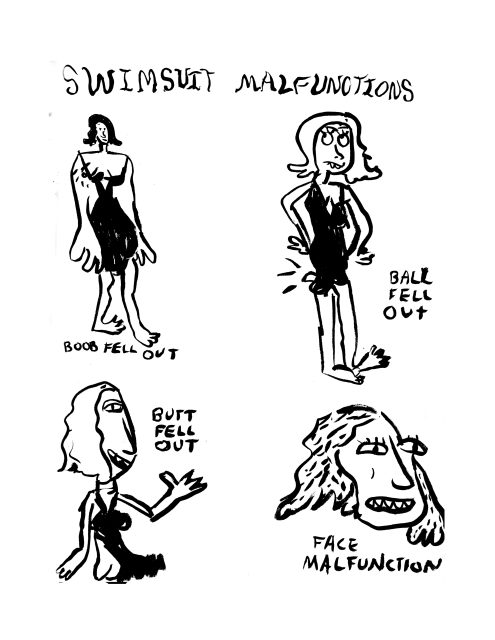 Swimsuit Malfunctions by Sam Szabo
Swimsuit Malfunctions by Sam SzaboI think that a lot of trans people go through that phase of convincing themselves that there is something that we can say or do that's gonna just, crack the code or something. 'Cause it's just hard to reckon with how fucked up everything is. Like maybe I'm just not doing ‘trans’ right. The really sad truth is that that first story with the dick joke, that's what happened. I would have all of these long conversations with my loved ones about my transition, and then I would always say at the end, ‘Do you have any questions for me? Nothing is too invasive. I'm happy to answer any question you have.’ And four out of five of them asked me if I was gonna cut my dick off. Maybe they phrase it a little more delicately, but that is what people wanna know. Ultimately you can do your song and dance, but it’s not like I think it's a fruitless endeavor to try to be understood or to try to make art, or to write, write theory. All this stuff is valuable, but there is a moment where you start to feel like you're banging your head against a wall and I think it's very common for that to happen in the lifecycle of a trans creative, especially one that is making art from the very beginning as I was.
I did that little comic to sort of blow off steam in the middle of this larger autobio project. But basically once I did that, I was like, ‘Oh, wait, no, this is what I wanna be doing.’ And I actually just completely abandoned autobio for a few years.
This gets back to Solanas, there was something very liberating about having an alter ego where I could genuinely put this question of am I being good representation to the side for a second and allow myself to express things like anger or frustration and be mean and hide behind a character.
This leads me to Bechdel and Dykes to Watch Out For. DTWOF is ostensibly fiction, but once you know what Bechdel looks like and a bit about her personality, it's impossible not to see Bechdel as Mo, so Bechdel gets to hide behind this wall of newspaper strip fiction, which strikes me as a very queer desire to fictionalize and narrativize yourself as a way to show queer life and interiority with a shield between you and the world. What are your thoughts on DTWOF, and how it elucidates queer reality in a non didactic way? How is comics especially well-suited for telling these really difficult subjective narratives?
DTWOF is all about the tension between wanting to perform and, ‘Oh, don't look at me!’ And I super relate to that. One of the great joys of comics is that you can play out complicated and often contradictory elements of your personality using these proxies.
DTWOF is so good because [Bechdel’s] able to pick these characters up and put them down. Often a lot of those strips are just her reacting to a political event and you can tell that she's processing it in real time and you're in Mo and Lois, you're seeing two ends of her personality duking it out for supremacy. And there's something very alive and electric to that. Especially when she's commenting on current events.
What really sets DTWOF apart though, is the continuity of it all and the way that you watch the characters grow up for better or for worse. That prevents the characters from becoming these one dimensional sounding boards for [Bechdel’s] opinions. There’s such interiority, not to every character, but to most of the supporting cast. You really grow to feel for these characters, even though every now and then you're reading one and it's just like ‘Oh, Barnes and Noble is too big.’ But then another one will be a really moving meditation on love. I built up such an affection for those characters over the years. I'll refrain from commenting on Spent until I get to read it, but I'm really curious to see how she handles the time jump and how she handles the self in certain things.
Did you ever read Wendel by Howard Cruse? ‘cause I feel the same way about Wendel. [Wendel] is like a gay man version of DTWOF. It's so good. Howard Cruse, I mean, Howard Cruse is definitely one of the biggest influences on me, talking about the underground guys. But Howard also edited Gay Comix. Which was definitely an influence. The bluntness of gay comics, which I guess is the same as Wimmen, definitely led me to title, if nothing else, of Enlightened Transsexual Comix. Wendel is another incredible example of a strip that is able to give more nuanced takes on current events than just like a singular first person essay while also building some really sweet, subtle characterizations.
Bechdel has talked a fair amount about not considering herself an activist. Do you think writing something like DTWOF, Fun Home or Gay Comix, or Enlightened Transsexual Comix is a form of activism? Where does art lie in that taxonomy?
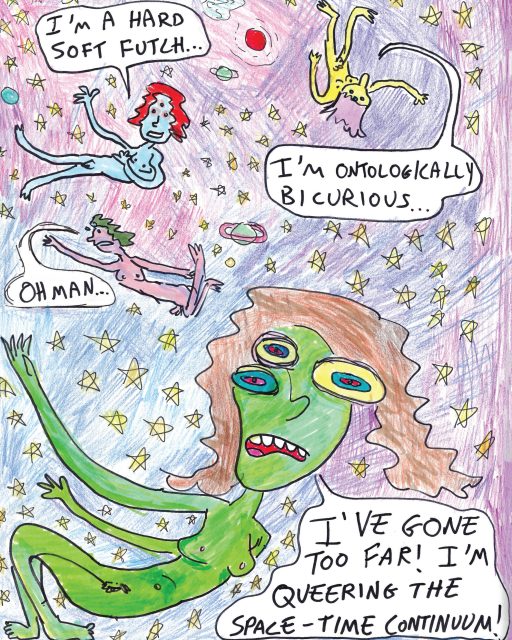 page from The Enlightened Transsexual by Sam Szabo
page from The Enlightened Transsexual by Sam SzaboThat's the million dollar question. Bechdel's gone on record a couple times saying stuff like that, and I actually really appreciate her candor because it's hard to give the answer to that question. It’s complicated. It's not a yes or no. But I think it's one that we should all be asking ourselves, especially in this moment. Since the book and my art career has taken off, and art has occupied more and more of my time, there's been less time and energy left over for political activism, which I feel like was a bigger part of my life in the years leading up to the book’s release, and I feel bad about that. It's not like it was a conscious choice, but my life has gotten very busy in very cool ways
I do believe that what I'm doing is worth doing and or I wouldn't be doing it, but I do agree with [Bechdel]. I'm not an activist. I don't have any illusions that this is going to radically change the world. Art is not a replacement for activism and community building in your life. That is a different need that requires different behaviors.
But I do think that at this moment in time, making art that is expressly political is very important. And it does sound cringe and hokey to say it out loud, especially if you're the one that's making the art. It's embarrassing for me to be saying it now on the Zoom, but I do believe in what I'm doing. I credit trans artists, but also just anyone who's visibly trans.
I wouldn't have transitioned if I didn't have access to trans voices. I didn't have access to a ton of trans writers and cartoonists before I transitioned, but I did have some. Carta Monir’s work was coming out in the years leading up to me transitioning and it had a profound effect on me. I'm still all these years later so grateful to her for sharing these very vulnerable stories. She wasn't the only writer writing about trans stuff, but she was the only writer in my little trans indie comics scene that I was a part of. Having her work come across my desk in a moment when I needed it really did change the course of my life. It sounds narcissistic to even entertain the possibility that something that I've done could have that effect on somebody. Trans people being generous with their voices and stories is the reason that I'm here today It feels so self-important to presume that I could maybe have that impact on somebody else, but I also know that that's true, and you don't need to be an artist to do it. You just living your life, experiencing joy…all political. Just existing is political. But all of that's to say that there are limits to what art can do, and the political moment that we're in requires a stiffer drink than theory. I think there is gonna need to be some mobilizing and some infrastructure as shall we say, and I'll let readers fill in the gaps themselves.
But we've gotta get mobilized and it's my hope that art can be a conduit to that. If you've got enough people reading you, I think it’s easy to rest on your laurels and feel like you're doing your part and you are, but other stuff needs to happen, and I need to practice what I preach- going to meetings, if you know what I mean. We have obligations that extend beyond the boundaries of art. But I say that without diminishing the importance of art. Because I do think that it's my life's work, and I think it's what I'm good at. I think that’s part of Allison's addendum whenever she was saying the thing you're alluding to. Whenever she talks about how she's not an activist, she also says, ‘I'm a lousy activist. This is what I'm good at.’ I feel that way too a lot of the time. I think this is what I'm good at. My executive functioning is not great. I'm not good at spreadsheets, I am good at comics. You don't want me organizing your march, trust me. I know because I've been involved in union drives, I'm a lapsed member of the DSA. There's a lot of different things you can do. I think for me to say that comics is the only thing that I can do is a little bit of a cop out. It's what I want to do, it's the most fun form of activism for me. I think it is what I'm best at. And I think that it is important. But I would encourage all of my cartoonist peers to get off their asses and go to a meeting. Go to a meeting, do it.
On the subject of actually doing stuff, let's talk about Lynda Barry, who does arguably more than any cartoonist working right now in terms of things off the page. I've heard you talk about Lynda Barry as the person who inspired or galvanized you to become a professional cartoonist. So much of Barry’s work is very explicitly about teaching people how to be artists. What have you learned from her?
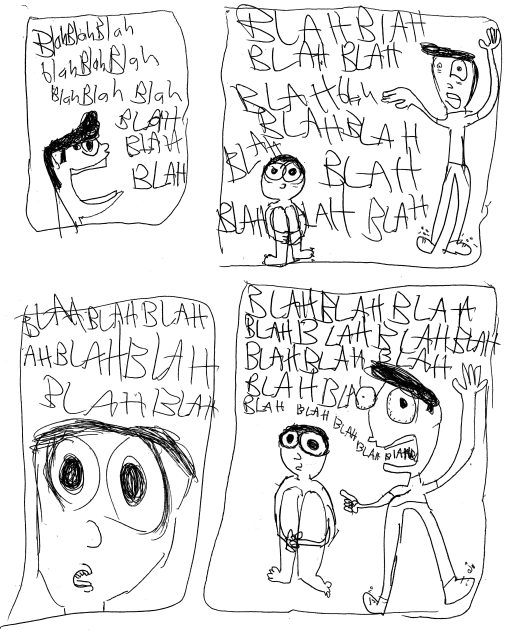 page from Sam Szabo's Acid Comix
page from Sam Szabo's Acid ComixGod, yeah. All of her theory books are total treasure troves. The story with me and Lynda is she was close friends with my academic advisor in college. I was studying creative writing, and really having a bad time with it. I'd reached a plateau in my development. And I was really dissatisfied with everything I was writing and was seriously thinking about dropping out. The great novelist Dan Chaon was teaching an introduction to comics class, and that just blew it wide open and opened all these new vistas for me. Lynda at the time was getting ready to teach her first UW class so she wound up dropping in on one of our classes unexpectedly. And I was doing a lot of acid at the time, and I had turned in my final on acid, kind of daring my teacher to flunk me a little bit. They were just totally unreadable. I actually just rescued them from my parents' house this week because I think I'm going to finally remaster and reprint some of my earliest zines. They're really good, but my handwriting is completely illegible. These comics were really bad. But I left them there with him. And when I came to pick them up, Lynda was standing there in full Lynda face with the lipstick, bandana, and the braids.
I didn't even recognize her, and my professor just handed them to her. And then I came back to get my grade, and he was like, ‘Oh, yeah, I gave you an A.’
And I was like, ‘Oh, cool, can I have them back?’
And he was like, ‘Lynda has them.’
And I was like, ‘Lynda, Lynda who?’
And he was like, ‘Lynda Barry.’
And I was like, ‘That was Lynda Barry?!’
But anyway, she winds up coming in, just showing up at my class the next night and gives them back. And she gave me just an incredible pep talk that genuinely changed the course of my life. She wrote me a little note and I wish I could remember what it said, but she gave me some excellent advice. And I think the first thing she said was just, ‘Do not try to change anything. Keep going, make lots of comics. A lot of people are going to give you advice, don't listen to them. A lot of people are gonna tell you what you're supposed to be doing. Just keep doing exactly what you're doing.’ I really took that to heart. And I made a lot of really bad comics. I think my comics got even worse because I took her words as gospel. I just refused to even edit any of my writing after that. In the short term, that was maybe detrimental to my development because I went from being incredibly self-conscious to just feeling completely indestructible because with her co-sign, I believed in myself with a fervency that I have never had before or since.
The sort of naivete of childhood is like something beautiful that you can never totally get back. And a lot of her art practice has been about unlearning these layers of self-consciousness and returning to the innocence early childhood. Abandoning the idea of even just knowing what a bad comic is. Ultimately when I think back on what made me pivot to comics, I was stalling out in my writing at the time. I was trying to be a real novelist, and I had hit a wall in my development because there is a certain adolescence in the life of a creative where you get smart enough to see what you're doing wrong and it causes you to stiffen up. There's a way to move past it, and there's a way to learn and get better at your craft and still find your way back to the spark of creativity. But inspiration and creativity are so ephemeral. If you look down even for just a moment you can completely freeze up and lose everything. And that was what was happening to me in my life as a writer at the time that Lynda came into my life.
So much more than any kind of intrinsic quality of the medium of comics, the reason that comics appealed to me, is that I was bad at them. And I was allowed to be bad at them, because I have no art training whatsoever. I had never taken an art class and I couldn't articulate what I was doing wrong. I wasn't a good artist, but I didn't know what made me a bad artist. I didn't know words like perspective and stuff like that.
I wound up going through that same sort of adolescence with myself as a cartoonist. I think in my mid-twenties, when I did I did eventually get good enough at art, I became aware of my own limitations. And that sort of sentience is a part of your development, when you're learning any kind of creative vocation. It's such a wall that it often kills it for people. A lot of [artists] reach that level of understanding what they're doing wrong, and then they give up. And I almost did with my poetry and with my prose. But with comics, that burst of freedom of not knowing what I was doing kind of bolstered me.
It took me years of blind confidence just knowing "I don't know what I'm doing, but a genius thinks that I'm good at it, so I'm just gonna keep going". Eventually the engine sputtered out and I did realize I don't understand perspective, or I'm not putting enough ink on the page. I need to start inking my background. And there were times when it would totally paralyze me, but I think Lynda’s advice stayed with me and it's almost a sort of faith that you carry with you, that you're gonna do it wrong, and it's okay. But I think a lot of cartoonists are perfectionists. A lot of us have obsessive compulsive disorder. A lot of us have a hard time with failure. A lot of us have a hard time surrendering control.
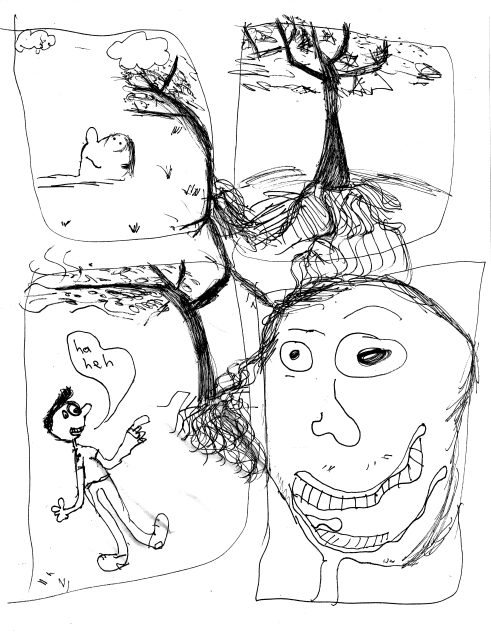 page from Sam Szabo's Acid Comix
page from Sam Szabo's Acid ComixI don't wanna speak in too many broad generalizations, but I think these are all personality traits that appeal to the cartoonist. All of these proclivities can form real roadblocks if you're not limber enough or elastic enough to stretch past them. That's what a lot of Lynda's theory is getting at. It really did save my life. I still feel like my creative life is a cyclical series of those moments. Even now I find myself having these moments of breakthrough and then these moments of intense self-consciousness as I see the next rung of the ladder in front of me right now.
I'm trying to write my first long form nonfiction book, and I'm having that problem. I'm kind of looking down and getting too self-critical, I'm like feeling out my own limitations. And it is paralyzing. I had to put the project down for a year, and I'm picking it back up now. Lynda is sort of the patron saint of this sort of obliviousness, or maybe obliviousness isn't the right word, but the childlike quality, tenacity, anbd hardheadedness that it takes to to hang on to this inner naive childhood spark that you need to keep alive as you move through these stages of development.
[Lynda’s] still a hundred percent spontaneity, and she still works very quickly. I think any readers who are finding themselves struggling with their limitations in the way I just said, working quickly is a great way to circumvent that self-consciousness. I used to work very, very quickly as a means of always moving forward. Now as I've gotten a little more secure, I move slower, but if I find myself getting bogged down by self-consciousness, I will just force myself to draw as quickly as possible. And Lynda does that too. Lynda's very into timed exercises in her classes, but you'll see it even just with the stuff she posts on Instagram, in her own personal work, she'll still move very quickly. The one other really good advice is if you can't think of anything to write, just draw a really big spiral, but draw the lines as tight together as you can while still having white space in between each circle. And that actually really works for me.
She's so cool. I am proud to call her a friend, even though I see her maybe once every couple years, we keep in touch. And she has been unbelievably supportive to me throughout my entire career. I really would not be making comics if it wasn't for her. I'm not just overly self mythologizing here. Her giving me encouragement at a particularly vulnerable moment. It was just a very directionless moment in my life. I was already feeling this, real burst of possibility with drawing comics for the first time. But having her believe in me at a time when I needed that really changed the course of my life.
Who are three people you think everyone should be reading right now?
Fantagraphics' anthology of Julia Gfrörer's work, she is one of the most underrated voices in comics and is really testing the limits of the genre. She does incredible stuff with short form. Her short stories are so self-contained, but also thematically like minis for many years now. Getting to see them all side by side really brought into focus their breadth scope.
Margot Ferrick and Lale Westvind are making my favorite comics. I think the work that they do comes from another planet and almost like exists outside the canon of comics. They belong to genres of their own and I do feel like they're pushing the medium forward in really exciting ways.
I think Edie Fake is my last choice. I'm picking people who I almost like don't consider part of the traditional comics canon. They’re part of the scene and they're all my friends or at least acquaintances, but I feel like they are like on the margins. They’re perched at the boundary of what comics is, and they're, they're pushing hard.
The post ‘Trans people being generous with their voices and stories is the reason that I’m here today’: Sam Szabo’s path to enlightenment appeared first on The Comics Journal.






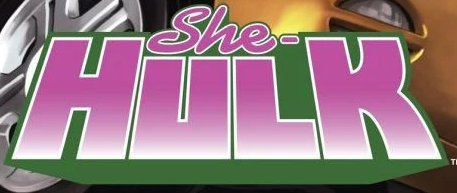
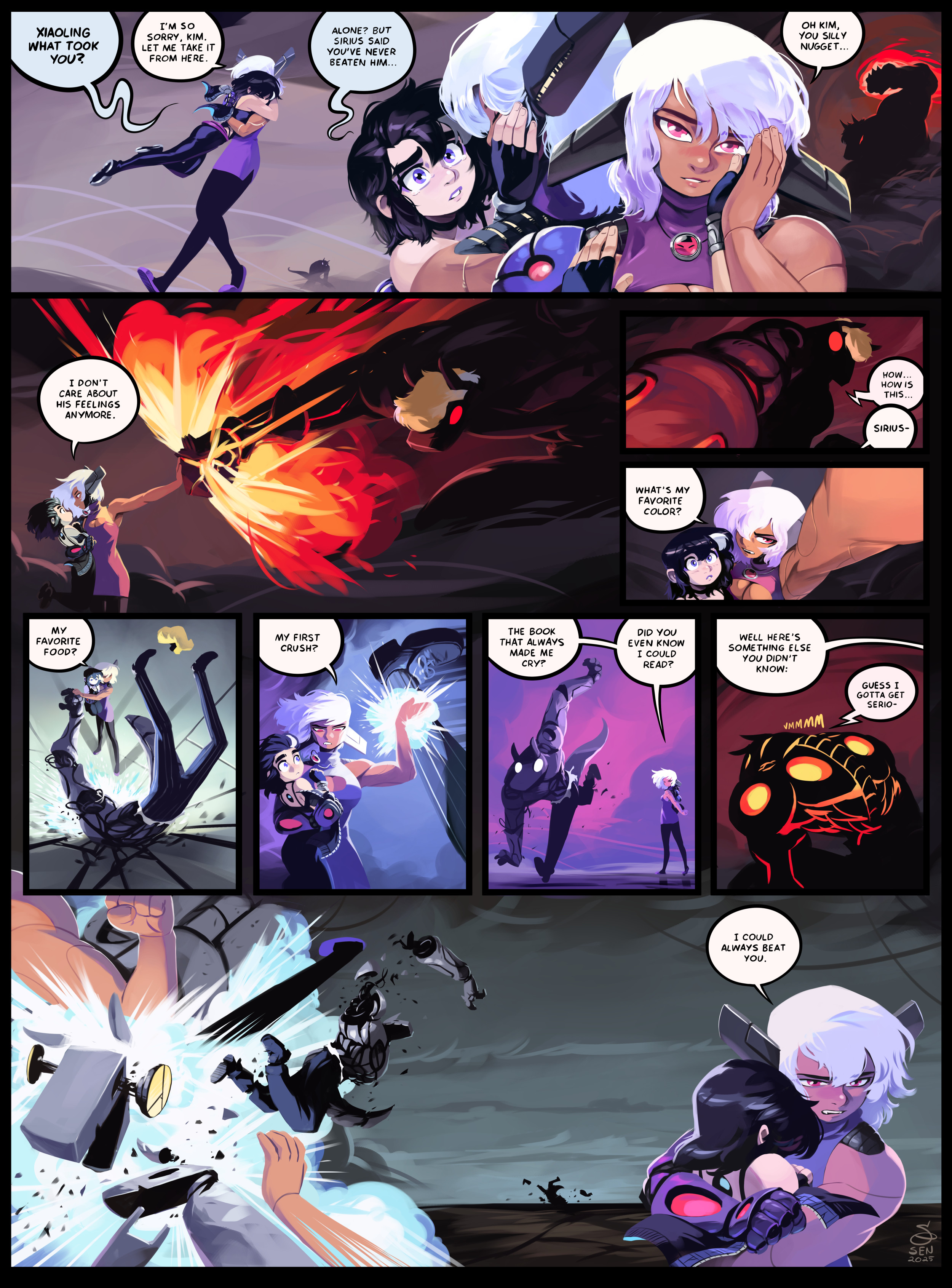
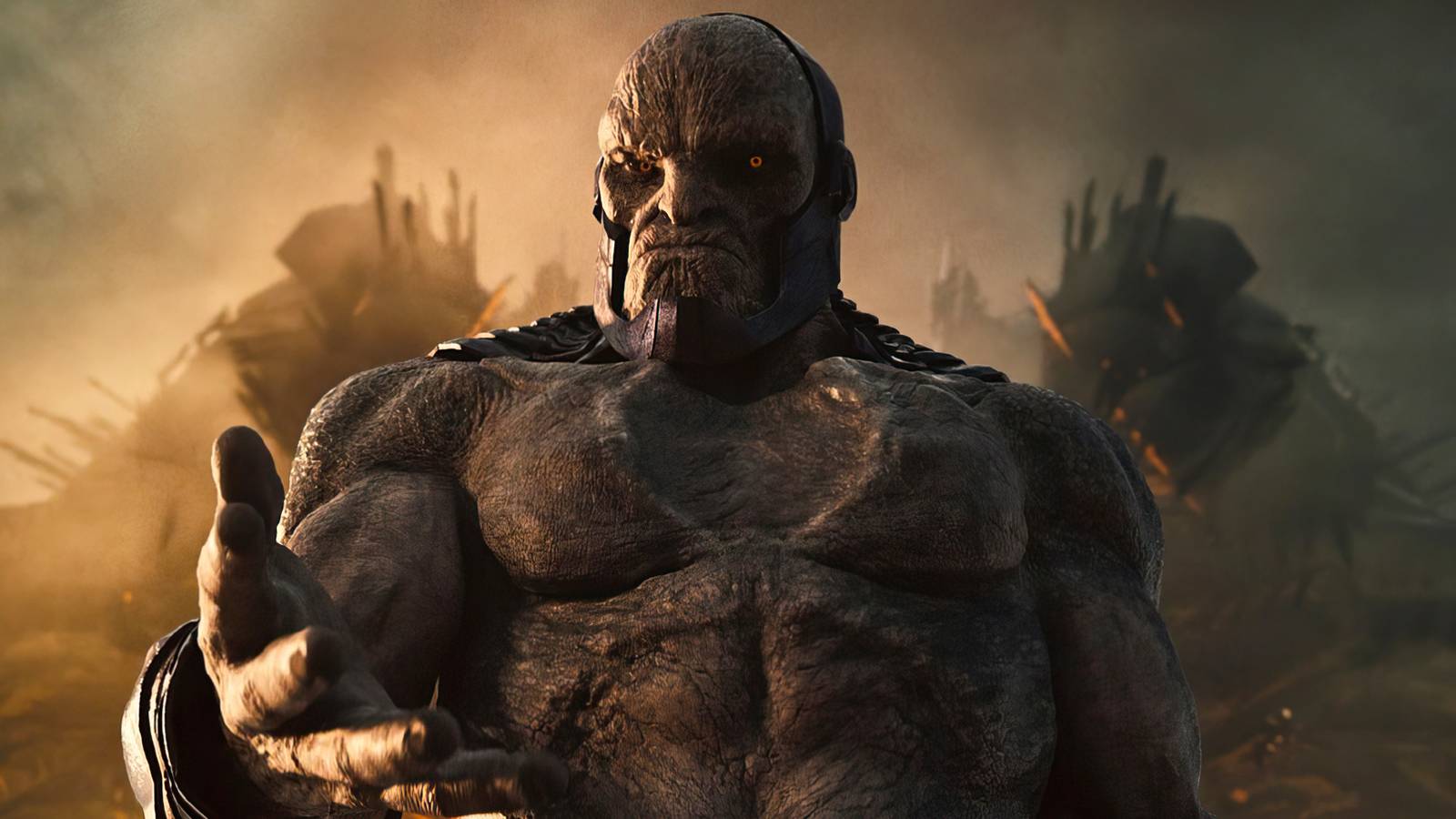

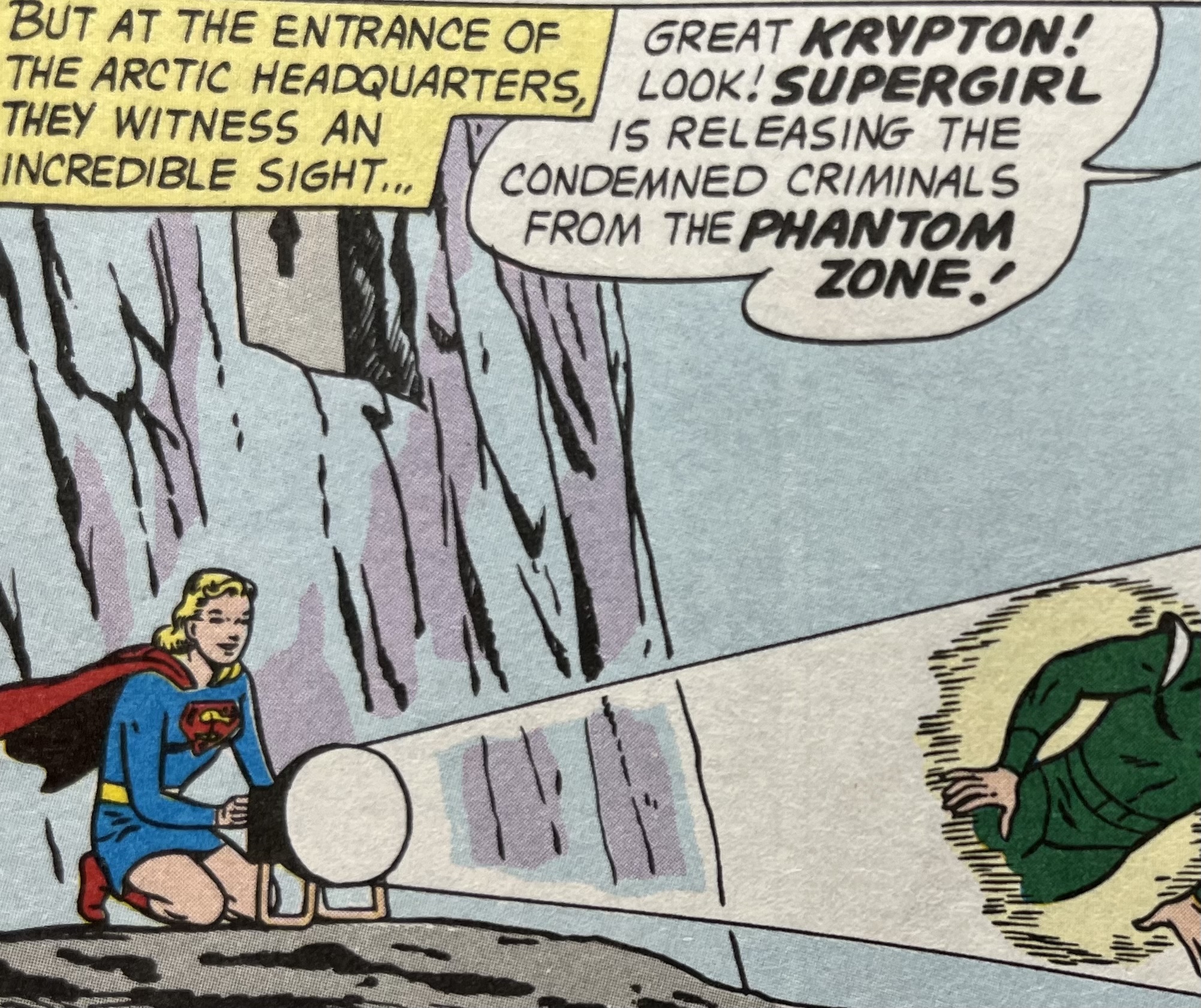
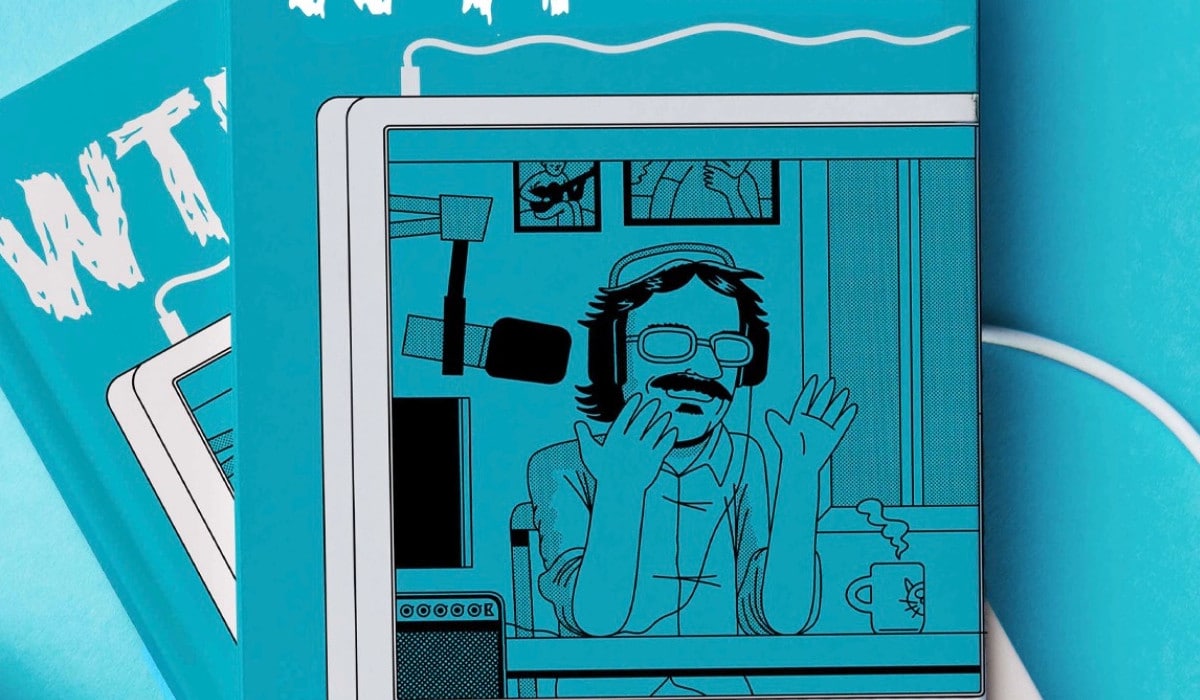



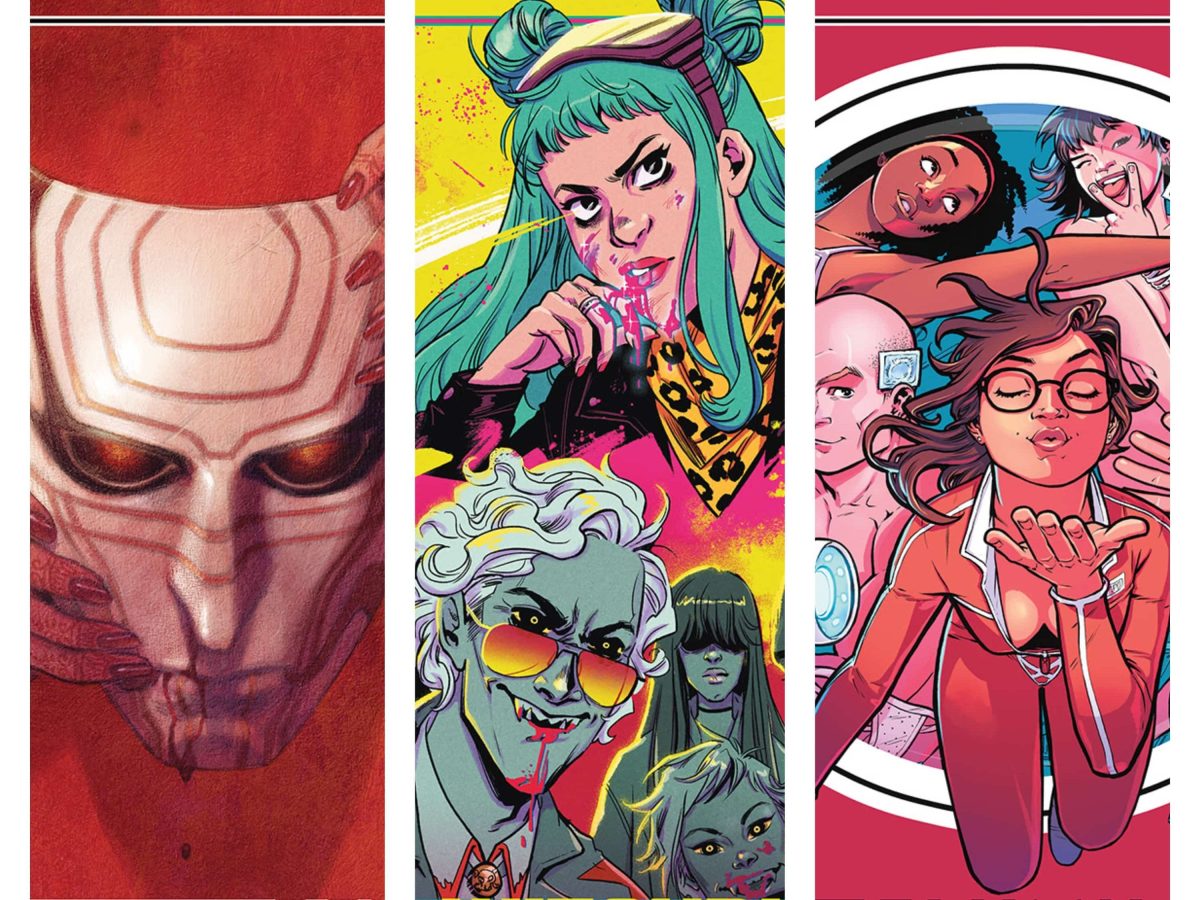



 English (US) ·
English (US) ·